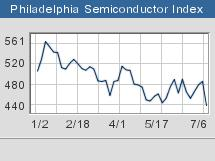NEW YORK (CNN/Money) -
Semiconductor stocks fizzled like a damp firecracker Tuesday after an analyst's cut of earnings estimates for Intel and a warning from Conexant Systems put investors in a dour post-holiday mood.
Intel's stock fell nearly 2 percent after Lehman Brothers trimmed its third-quarter earnings estimate for the semiconductor kingpin. Although Lehman said it thinks Intel (INTC: Research, Estimates) will report solid second-quarter results next week, it said that it expected weak demand for personal computers in the crucial back-to-school shopping season to hurt results going forward.
And shares of communications chip manufacturer Conexant (CNXT: Research, Estimates) plunged more than 40 percent after the company warned that fiscal third-quarter sales and earnings would be much lower than expected.
Conexant blamed increased competition from Taiwanese semiconductor makers as well as slack demand for wireless local area networking (LAN) chips. Rivals Broadcom (BRCM: Research, Estimates), Marvell Technology (MRVL: Research, Estimates), Texas Instruments (TXN: Research, Estimates), Agere Systems (AGRA: Research, Estimates) and Atheros Communications (ATHR: Research, Estimates) fell in sympathy.
The Philadelphia Semiconductor Index, which is comprised of 18 leading chip and chip-equipment stocks, slipped more than 4.3 percent Tuesday morning. The SOX is now down 14 percent this year.
Semis still pricey...
So is the chip cycle coming to a peak?
After chipmakers reported strong results in the second half of 2003 and the first quarter of 2004, investors appear to be worrying that growth may slow in the second half of this year and in 2005. Several pieces of weaker-than-expected economic data from last week are contributing to these fears.
 |
|
| It's been a tough year so far for chip stocks. |
"It's amazing how quickly sentiment shifts. Two weeks ago, people would have sworn that the economy was gaining momentum." said Cody Acree, an analyst with Legg Mason. "But there's no reason to believe that if we have normal economic improvement then that won't translate into normal seasonal second-half demand."
But that's a big if. And given how expensive many chip stocks are, even after factoring in recent stock price declines, a cautious stance on the sector might be a good idea.
As such, Adam Parker, an analyst with Bernstein, wrote in a report Tuesday that even though he believes the chip cycle will not peak until late 2005 or early 2006, he only has outperform ratings on three semiconductor stocks: Intel, Analog Devices and Microchip.
| Related stories
|

|
|
|
|
Parker wrote that valuations for chip stocks as a whole are "not compelling" and that expectations for several chip companies, particularly with exposure to wireless, are extremely high.
Acree agreed that communications chip companies like Broadcom and Marvell were "easy targets" for a sell-off since they were trading at sizable premiums to larger bellwethers like Intel and Texas Instruments.
Broadcom and Marvell both have P/Es (based on this year's earnings estimates) of about 33, compared to a P/E of about 21 for Intel and TI.
...but slowdown fears may be overdone
Still, Wall Street may be overreacting to signs of a slowdown. David Wu, an analyst with Wedbush Morgan Securities, points out that there is a big difference between a cooling off in sales and earnings growth and a cyclical downturn.
"Is the most dynamic phase of the semiconductor recovery behind you? Probably so. But does that mean the recovery is about to fall off a cliff? No," Wu said.
Wu said that he wouldn't be worried about a further decline for chips stocks as long as the companies don't go overboard and build up excessive inventory (which was a bit of a concern in the first quarter) heading into the end of the year.
He said the biggest risk for semis is not an economic slowdown but that the companies would create their own recession by "spending like a drunken sailor" and building up a glut of chips.
So heading into second quarter earnings season, perhaps the most important number to keep an eye on for chips is inventories. If there is a big spike from the end of the first quarter, then that could be problematic.
Analysts quoted in this story do not have any positions in the companies mentioned and their firms have no investment banking ties to the companies.

|

